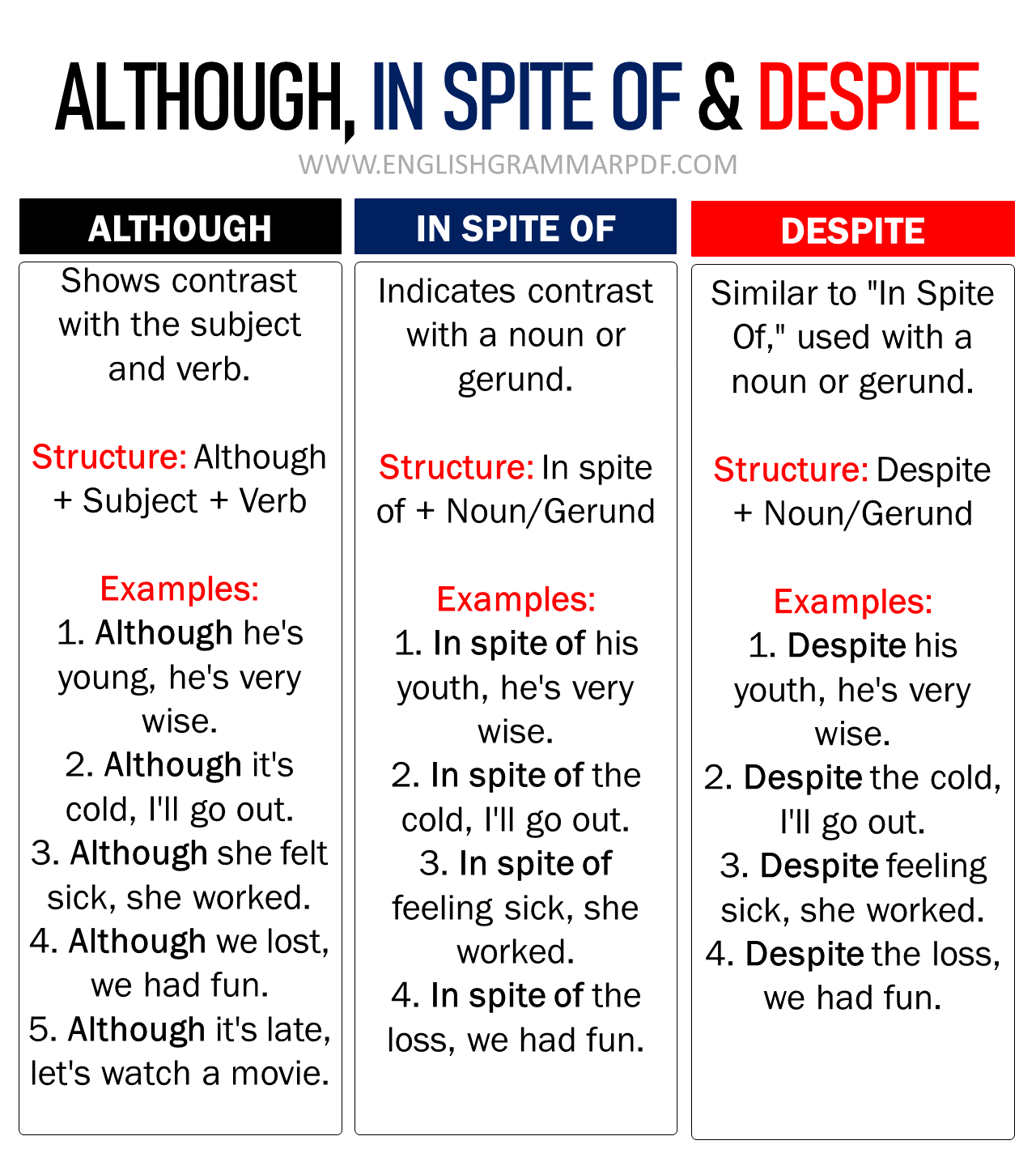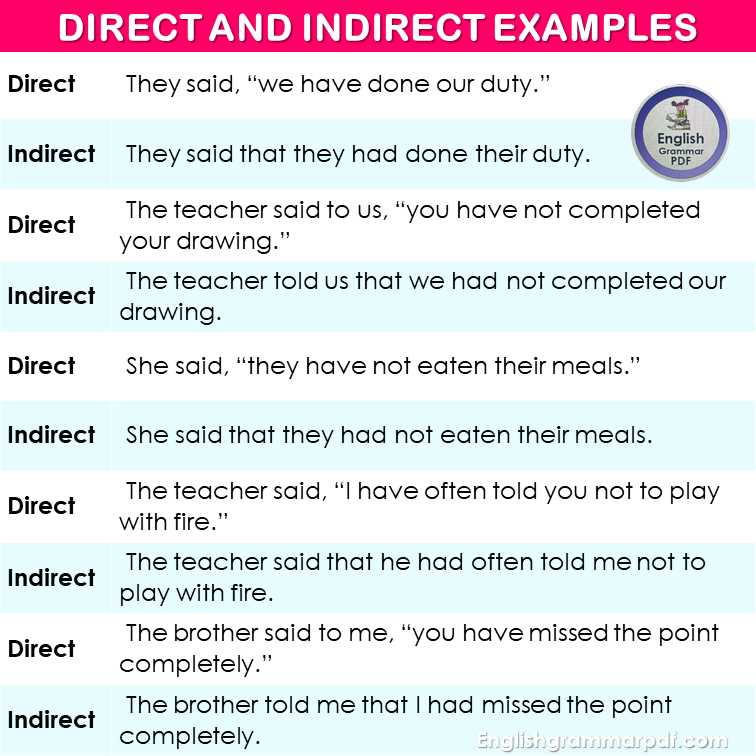Today, we’re going to learn about three words: “Although,” “In Spite Of,” and “Despite.” These words are used when we want to show that something is surprising or not expected.
For example, if it’s raining but you still go out to play, you can use these words to describe that situation. We’ll look at how each word is used in sentences so you can understand and start using them correctly. It’s like saying, “Even though this happened, I still did that.” Let’s dive in and make it easy to learn!
1. ALTHOUGH
“Although” is a conjunction used to introduce a subordinate clause. It indicates a contrast with the main part of the sentence and is similar in meaning to “even though” or “but.”
Usage:
- It is used at the beginning or in the middle of a sentence.
- It is followed by a subject and a verb.
Structure:
Although + Subject + Verb
Examples:
- In spite of the rain, the game continued.
- “The rain” is the noun following “In spite of,” showing the game continued despite the rain.
- In spite of feeling ill, he attended the meeting.
- “Feeling ill” is a gerund phrase following “In spite of,” indicating he attended the meeting even though he felt ill.
More Example:
- Although she’s allergic to cats, she has three.
- He went running, although it was extremely hot outside.
- Although the task was difficult, they completed it on time.
- Although he was not feeling well, he attended the meeting.
- They enjoyed the picnic, although it started to rain.
- Although the movie was long, it was very entertaining.
- She smiled, although she was feeling sad inside.
- Although the team was behind, they played with great spirit.
- Although it was past bedtime, the children were still awake.
- He accepted the offer, although it was lower than expected.
- Although the car was old, it was in perfect condition.
- Although the road was busy, we had a good time.
- She decided to walk, although she could have taken a bus.
- Although the weather was cold, the sun was shining brightly.
- They went hiking, although the trail was known to be tough.
- Although he had little experience, he was offered the job.
- The dessert was delicious, although it was too sweet for some.
- Although the book was recommended, she didn’t enjoy it.
- He kept his promise, although it was not easy.
- Although the room was crowded, they found a place to sit.
2. IN SPITE OF
“In spite of” is a preposition that is used to show contrast or contradiction. It is similar in meaning to “despite” and indicates that something happens regardless of a particular factor.
Usage:
- It is often used at the beginning or in the middle of a sentence.
- It is followed by a noun, a pronoun, or a gerund (-ing form of a verb).
Structure:
1: In spite of + Noun/Pronoun
2: In spite of + Verb-ing (gerund form)
Example:
- In spite of the rain, the game continued.
- “The rain” is the noun following “In spite of,” showing the game continued despite the rain.
- In spite of feeling ill, he attended the meeting.
- “Feeling ill” is a gerund phrase following “In spite of,” indicating he attended the meeting even though he felt ill.
More Examples:
- In spite of the rain, the event was well-attended.
- They succeeded in spite of all the obstacles.
- She remained cheerful in spite of her illness.
- In spite of his fear of heights, he went skydiving.
- In spite of the traffic, we arrived on time.
- He managed to finish the marathon in spite of his injury.
- In spite of her busy schedule, she makes time for her family.
- In spite of the cold weather, they went for a hike.
- The flowers bloomed in spite of the harsh winter.
- He maintained his composure in spite of the provocation.
- In spite of the power outage, the party continued.
- They formed a close bond in spite of their differences.
- In spite of the criticism, she continued with her plan.
- The team played well in spite of missing key players.
- In spite of the economic downturn, their business thrived.
- She passed the exam in spite of not having much time to study.
- In spite of the language barrier, they communicated effectively.
- The picnic was enjoyable in spite of the ants.
- In spite of his age, he is very active.
- They reached an agreement in spite of initial disagreements.
3. DESPITE
“Despite” is also a preposition used to indicate that something happens even though there is a hindrance or obstacle. It has the same meaning as “in spite of.”
Usage:
- Like “in spite of,” it can be used at the beginning or in the middle of a sentence.
- It is followed by a noun, a pronoun, or a gerund.
Structure:
1: Despite + Noun/Pronoun
2: Despite + Verb-ing (gerund form)
Example:
- Despite the cold weather, they went for a jog.
- “The cold weather” is the noun following “Despite,” showing they jogged even though it was cold.
- Despite having a headache, she read the entire book.
- “Having a headache” is a gerund phrase following “Despite,” indicating she read the book even though she had a headache.
More Examples:
- Despite the rain, we went for a walk.
- Despite the heavy rain, the event continued as planned.
- She achieved her goals despite numerous obstacles.
- Despite his fear of heights, he went skydiving.
- They remained cheerful despite the bad news.
- Despite the challenges, they completed the project on time.
- He enjoyed the hike despite the cold weather.
- Despite the language barrier, they became good friends.
- She passed the exam despite not having much time to study.
- Despite the traffic, we arrived on time.
- They decided to picnic despite the cloudy sky.
- Despite his busy schedule, he makes time for his family.
- Despite the power outage, the party was a success.
- Despite her initial reluctance, she ended up enjoying the movie.
- The team won despite being the underdogs.
- Despite the pain in her leg, she finished the marathon.
- Despite the economic downturn, their business thrived.
- Despite the critics, the show became very popular.
- Despite the long distance, they maintained their friendship.
- Despite the simplicity of the meal, it was delicious.
- Despite his age, he is still very active.

Summary
- “Although” is used to introduce a contrasting clause that shows an unexpected outcome.
- “In Spite Of” and “Despite” are used similarly and can often be used interchangeably.
- They are followed by a noun or a gerund to show that something happens even though there is a reason for it not to.
- These structures are crucial for adding depth and complexity to your sentences by showing contrast or contradiction.


